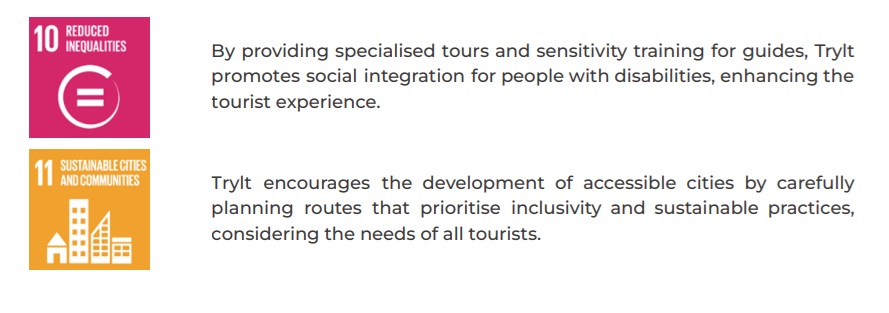Best practice from Hungary: Trylt – A Model for Inclusive Job Preparation
Trylt is a Tour Operator that offers city tours in Budapest for both Hungarian and foreign groups. The company has provided both fixed-route and personalised tours. The goal of the company is to provide a unique experience for guests.
Context
When Trylt was established in 2020, one of its objectives was to provide specialised city tours for individuals with limited mobility. The inspiration for this initiative came from the founders’ personal connections with people with disabilities, which made them aware of the lack of accessible tourism options. Specific needs of this demographic were not addressed by existing tours. This realisation motivated them to create inclusive tours that ensure equal access to cultural experiences. The company currently has four permanent employees including its two founders, one permanent tour guide, one project-based employee and a few occasional tour guides.
Implementation
Before launching Trylt, the founders initiated a planning phase, which involved renting a wheelchair and mapping out potential routes. The purpose of this phase was twofold: first, to gain a first-hand understanding of the user experience, and second, to identify specific challenges along the routes, such as pedestrian points, staircases, and sharp turns. Through multiple rounds of trial and error, they developed a final checklist to ensure the accessibility of each route. This checklist also served as a basis for contingency plans, recognising that a single misstep could negatively impact the overall experience for wheelchair users. After completing the initial phase, the founders developed training programs for tour guides to ensure a seamless experience for participants. The checklists created during the planning phase serve as a foundation, directing tour guides on the specific accessibility issues they need to be aware of. In addition, the training emphasises the development of soft skills, teaching guides to approach guests with respect, care, and sensitivity to create an inclusive and supportive environment.
Enabling Factors
Trylt adapted the principles of the European Disability Card into its tourism offerings, promoting social inclusion and equal opportunities for individuals with reduced mobility in Europe. This program served as a guide for developing their services. Another enabling factor is the company’s careful planning, which ensures their tours are uniquely designed to meet the needs of this demographic. Additionally, Trylt has received national project funding aimed at creating cultural experiences for people with disabilities. This has allowed the company to offer tours to this group with expenses covered in the past.
Barriers
Trylt identified several recurring barriers to its operations. First, the extensive planning phase is reflected in its elevated price, which deters potential customers. Hungarian tourists, particularly those with disabilities, exhibit high price sensitivity, which negatively affects demand for the company’s services. As for foreign tourists, there is a lack of interest for accessible tours. Many international visitors with disabilities prefer conventional city tours, relying on family members for assistance during these experiences. Lastly, various external and technical factors can negatively impact the tours, such as malfunctioning lifts in buildings that are part of the planned itinerary.
Impact on the Organisation
Trylt constantly receives positive feedback regarding its tours. Customers highlight the carefulness with which the tour was evidently planned, and the kindness of the tour guides.
Quotes
‘Customers really appreciate the extra carefulness when planning a personalised city tour.’
‘It is an excellent sensitivity training for the tour guides.’
Lessons Learned
Trylt acknowledges that the sensitivity training imparted unto its guides is highly effective for understanding the specific needs of individuals with disabilities. By having tour guides experience the tours as if they were part of this cohort of people, they can lead with greater care, respect, and patience. Additionally, Trylt encourages other tour operators in Europe to replicate the same methodology. Trylt advise them to do the accessible routes advertised online and assess their feasibility. By identifying necessary adjustments, tour operators can turn this into an offering to better serve individuals with disabilities.
Future Plans
Trylt will continue to improve their training by considering the feedback provided by users. They are open to receiving external funding to contribute toward the cultural enrichment of disabled people.
Links with UN Sustainable Development Goals
Read more about the full EDI here





No Comments